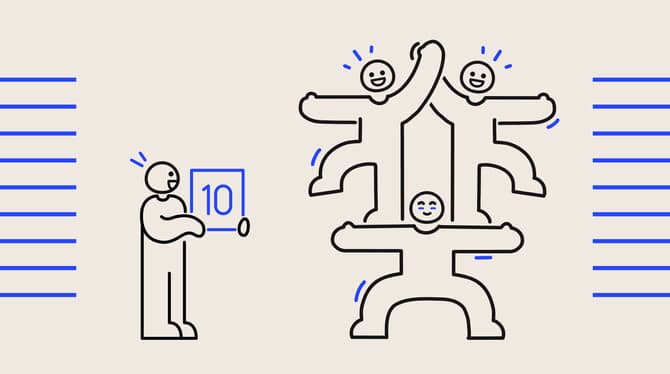Being able to confidently give your employee a promotion is a great feeling all around. The employee feels rewarded for their hard work, and managers feel that they have succeeded at leading their employee to the next step.
But it’s not that simple — the topic of employee promotion is a touchy one for employees and managers alike. There are so many caveats to offering a promotion: Is that employee really the best fit for the new title, even if their seniority suggests it's time? Is there room for promotion at all within the company, even if they are deserving?
According to research from Gallup:
Companies fail to make the right person manager 82% of the time.
That's a big number, and can lead to a lot of problems within the company, such as team misalignment, reduced employee satisfaction, and high employee turnover. That's why it's important to get promotions right.
Assess your organization’s employee experience in minutes

What's in this article
4 Reasons to promote an employee
Evaluating an employee for a promotion requires to assess the employee’s skill set, their effectiveness or performance at their current position and their potential for further growth.
However, employee promotion criteria will differ depending on circumstances and workplaces. There is not one set of rules to follow or a universal checklist for the promotion process. Dan Schawbel, author of the best-selling book “Promote Yourself: The New Rules for Career Success”, does, however, offer some great insights. Think about the following traits when considering an employee for promotion:
1. Always prioritize work and meet deadlines
Getting things done in a timely and efficient manner is a skill that can’t be overlooked. When an employee is constantly checking off their to-do list despite how challenging the tasks are, and pushes their own personal boundaries without being prompted to, these are great indicators that they are ready to challenge themselves even more.
2. Consistently have a positive attitude
No matter how hard-working your employee may be, if they don’t have a positive attitude, you might want to reconsider a promotion. Work is not only about getting things done, it’s about being an inspiration to the people around you, especially when you are moving towards a leadership role. The manager sets the mood of the entire team, so giving a positive energy will have an equally positive effect on employee morale and motivation.
3. Work well with the team
Being a team player is likewise very important when considering promoting an employee. Teamwork is one of the fundamentals of success in the workforce, so the people you promote would necessarily need to have strong teamwork and collaboration skills.
Leaders should not only interact with their team when they need something from them. They should work with them on a regular basis, establishing a work relationship based on trust and mutual respect.
4. Always put the team’s best interest ahead of their own
Moving up on the ladder is less about the employee as an individual and more about the organization as a whole. If your employee understands promotion as an upward movement within the company, for the benefit of the company — on top of being a personal milestone — then you should consider promoting this person.
Top signs that an employee is not ready for promotion
1. Lack emotional intelligence
In addition to knowing the hard skills required to do the job, there’s an element of personality that’s important for managers to consider when promoting an employee.
Emotional intelligence (EI) and empathy are some of the most important traits for leaders to have. After all, a leadership role involves dealing with a whole ecosystem of people including, employees, customers, partners, providers, and investors.
So, when promoting an employee to a leadership role, the following EI personality traits should be looked for:
- They are more likely to stay calm under pressure.
- They are empathetic to others.
- They make thoughtful decisions.
- They find effective ways to resolve conflict.
- They learn from mistakes and admit to being wrong.
- They listen more than they speak.
- They are open to criticism.
2. Don’t possess the required skills
The Peter Principle is a concept in management that says that people are promoted based on their skills in their current role, and not in their future role.
When promoting an employee, remember that there will be a learning curve before they settle perfectly into their new role. Think about the skills they possess now, and if they have any of the required skills needed for the next step, such as management skills if they would be entering a managerial role.
3. Have challenges applying feedback
If your employee doesn’t listen to or learn from the constructive feedback you're giving them, it is a sign that they are resistant to improvement. Not being open to bettering themselves as employees is a reason to hold back on promotion.
The best candidates for promotion are those who are constantly eager to improve.
Not being open to learning is a sign that they are not open to growth — and promotion means growth! The best candidates for promotion will actively seek for feedback and apply it with a mindset of continuous improvement.
How to help your employees improve and grow
Just because your employee might not be suited for a promotion at this point in their career doesn't mean they'll never get there. Your role as a manager is to provide opportunities for employees to learn and improve in their current role and guide them through possible career paths within the organization.
Here are three ways to help your employees grow:
- Set goals: If an employee didn’t receive the promotion they wanted, it’s important to help them set professional goals. With a clear understanding of what they need to do to earn a promotion, employees can feel more engaged in their work and reach new levels of performance.
- Professional development opportunities: Let your employee know that you are invested in their growth within the company by supporting their professional development. Help them find courses, certifications, or mentorship programs to guide them in the right direction.
- Give them constant feedback: Give performance feedback to your employees regularly, during weekly check-ins or bi-weekly one-on-ones. Days get busy and weeks go by quickly but it’s important to take the time to sit down with your employees to go over their work, answer questions and monitor their progress.
Sign up for our free 11-day leadership course that will help you be the best leader you can be.
Ideas to compensate non-promoted employees and keep them motivated
Some employees are not ready to be promoted but others just can’t be. Often there is no opportunities to promote these employees — they have reach the highest level in their field of expertise or there are no openings to fill. To keep them engaged and eager to improve and grow, it’s essential to compensate them in other ways.
We've identified ways to keep your employees motivated without a promotion:
- Financial compensation: Money is not always the most important motivator, but a bonus and/or a raise to acknowledge an employee's hard work would not go unnoticed. It would offer them the consolation that there is room for moving up the pay scale.
- Remote work: Letting your employees work from home is a great perk that indicates that you trust them completely. Giving them this advantage encourages employee autonomy and leadership, and shows that you care about your employees' wellbeing and work-life balance.
- Professional development: This is a means of helping your employees grow but also a great way to keep them motivated. Ask your employee if there are any development opportunities they would like to pursue and brainstorm ideas together to see what's possible.
- Work-related side projects: Let your employees work on creative or innovative side projects that they’ve been wanting to explore. For example, you could let your employees take 10% of their time to focus on their own creative initiatives. Granting this opportunity demonstrates trust. And the extra responsibility will empower your employees.
FAQ on employee promotion
What role does performance and potential play in the decision to promote an employee?
Employee performance and potential are important factors in promotion decisions. High performance reflects an employee's ability to meet expectations, while potential indicates their capacity to take on additional responsibilities, learn new skills, and grow within the organization. Considering both aspects helps identify candidates aligned with long-term goals and succession planning strategies.
Can promoting an employee help create a positive impact on team dynamics and collaboration?
Yes. By promoting an employee, it sends a message to the team that hard work and dedication are recognized and rewarded. This can boost morale and motivation, fostering a sense of camaraderie and teamwork. A promoted employee may inspire and mentor their colleagues, leading to increased collaboration, knowledge sharing, and overall team synergy. Ultimately, promoting employees can create a positive ripple effect, improving team dynamics and enhancing the overall productivity and success of the team.
How does promoting an employee benefit the organization and contribute to its growth?
The promotion of an employee can bring significant benefits to the organization and contribute to its overall growth. First, it can boost employee morale and motivation. When employees see their peers being recognized and rewarded for their hard work, it inspires other employees to strive for excellence and fosters a culture of continuous improvement.
Promoting employees also enhances employee retention rates. When individuals see a clear path for career advancement within the company, they are more likely to stay and invest their time and efforts into their roles, which reduces turnover and the associated costs.
When promotions are offered from within, it sends a powerful message to the entire workforce that the organization values its employees' growth and development. This can lead to increased loyalty and a stronger sense of commitment from the employees that translate into improved productivity and performance.
Equip HR and managers with tools to engage, recognize, and drive performance.




